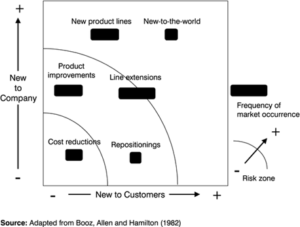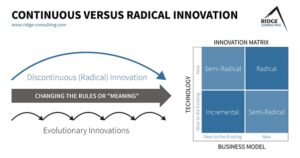Cloud technologies offer channel partners a platform for the kind of tech experimentation, rapid development, and distribution that used to be the province of the IT department. All of this means that at a time when corporate IT budgets are tied up in operations and maintenance, other business managers are turning to Cloud computing to expand their businesses.
This creates the exciting prospect that a Head of Operations or Customer Service can now lead disruptive initiatives within their company without the need for intensive input from the IT department.
Technology vendors can recruit channel partners that can move outside of the IT department, enabling Line of Business Heads to develop new operating capabilities that transform the business; or disrupt existing patterns in their own operations and their competitors to create new value chains, changing their industry’s economics.

The chart below may be helpful for channel partners and their clients to use as a guide to the different types of innovation that they can bring to their company through new Cloud-based technologies. Although it comes from a theory developed in 1982, the same principles hold true.
The chart illustrates the continuum of innovation that business executives can bring about. It is worth noting that “New to the World” innovations many not necessarily be classically “disruptive”. They may fall into the category of a “transformational” innovation within the “discontinuous” category. For business executives, the names and categories are less important than the business impact.

The important learning for the business executive is to try and leverage new technologies in order to move beyond “evolutionary innovations”. Their goal must be to seek out more “radical innovations” while managing the increased risk that is inherent in new business models. The learning for technology vendors is that they need to provide new channel sales training so that both channel managers and channel partners have the vision and capabilities to create and implement such disruptive solutions.
The diagram below provides an interesting summary of how a single radical innovation can leapfrog a series of incremental, evolutionary innovations giving the company a first-mover advantage in a new segment.

A good example of radical innovation enabled by technology is Drivewyze. The company piloted a hands-free application called Drivewyze PreClear that offers a safe and secure way for truckers to request and receive bypass clearance at both permanent weigh stations and mobile inspection sites.
After its successful pilot, Drivewyze needed to move the service into production. Evaluation of the costs of building its own infrastructure was prohibitive. Drivewyze decided to build the Drivewyze PreClear service based on IBM SmartCloud Enterprise+ which provides a fully managed and production-ready Cloud infrastructure.
IBM’s Cloud offered a highly secure environment, a critical component to a Drivewyze service that accesses carrier and vehicle safety records that are screened by law enforcement. The Cloud infrastructure provided Drivewyze with a cost-effective technology solution that enabled them to rapidly introduce market-changing innovation.

Channel sales training needs to emphasize that cloud technologies are phenomenal enablers of business models that can be built quickly and relatively inexpensively to deliver a disruptive impact. Rather than the onerous costs and time pressures previously associated with bootstrapping IT infrastructure, Cloud enables anyone with a disruptive business idea to launch their product quickly.
The scalability and availability of Cloud mean they aren’t restricted by their IT needs. New ideas can start small, without a large capital outlay, allowing the business to remain agile by failing fast and trying new things without large costs and overheads.
The disruption that is taking place in most modern businesses represents a huge opportunity for many companies. Disruption led by the efficiencies and possibilities of the Cloud presents an opportunity for Challenger brands to address a gap in the market or offer in a new way of meeting and sometimes exceeding an existing consumer need. For market leaders, Cloud offers the possibility of evolving their business model, collaborating with developers and getting their products to market faster.
Disruptors live by the “fail fast” motto of trying many different experiments with their products until one breaks through. They can fail fast because the Cloud minimizes the risks involved in launching products quickly. Large enterprises are often hesitant to launch new systems, products or services because the approval process is so slow and acts as a barrier to rapid innovation. With the Cloud, that way of thinking has outlived its usefulness. The alternative to innovation is irrelevance.
Market Positioning

Positioning refers to the place that a brand (company, product or person) occupies in the mind of the customer and how it is distinguished from products from competitors. Its objective is to occupy a clear, unique, and advantageous position in the consumer’s mind.
It requires the channel partner to create a distinct position in the buyer’s mind through appropriate communication activities. What matters is how the buyers perceive the company, not how the company sees itself. Most importantly, it is about how the channel partner uses channel sales to influence how they are seen relative to its competitors.
For the channel sales partner that wants to be perceived as an enabler of disruptive innovation by clients, it is not enough to simply state this concept. Nor is it enough to just develop the internal capabilities.
Positioning is only as good as the communication that drives it. In a 2007 study, Deloitte & Touche (Marzec, 2007) found that companies that communicate their business strategies, achieve on average 43 % higher market to book ratio comparing to the ones which don’t communicate their strategies at all.
The Consequences of Poor Positioning
In 2016 The Statistic Brain Research Institute compiled a variety of statistics on business failure rates and the underlying reasons. In their “Information” category (which includes technology resellers) they found a 63% failure rate within the first four years. The same study identified “Incompetence” as causing 46% of failures, which included “Lack of Planning”.
Multiple studies have also confirmed the relationship between differentiation and company profitability. A 2014 Millward Brown study found that “people who believe a brand is meaningfully different on average pay up to 22 percent more than those who do not “.

Viewed from the buyers’ (and often a technology Vendors’) perspective this “generalist” strategy is counterproductive. The reseller is seen as a generic supplier of technology products and services, but a “Master of None”. They cannot be “Best in Class” in any area with this approach and are therefore less valuable as a strategic supplier/partner.
Within the technology industry, anecdotal evidence suggests that high failure rates amongst VAR’s can often be attributed to a lack of clear differentiation and positioning. From the technology resellers’ perspective it is an advantage to be a “Jack of All Trades”. They can provide solutions from multiple vendors across the entire technology stack, and thereby never have to lose a sales opportunity. Read on how to build a partner cosell program.
Training channel sales managers and channel partners to enable disruptive innovation to deliver competitive advantage for clients is a realistic proposition for many companies. Building your internal capabilities through channel training to reinforce this claim and communicating this message clearly in your market can lead your company to increased profitability, competitive strength and company growth.
About the Channel Institute
The Channel Institute is the only training body in the world that provides business training and certification specifically for the channel profession through a syllabus validated by a vendor-independent Industry Advisory Council. The Institute currently offers three certificate courses supporting channel managers, channel marketers and channel resellers:
- The Certificate in Channel Management
- The Certificate in Channel Sales
- The Certificate in Channel Marketing
- The Certificate in Digital Co-Marketing
The Channel Institute also licenses its course content to universities and vendor training academies to bolster their channel training libraries.
 Hi Boox Popular Magazine 2024
Hi Boox Popular Magazine 2024



